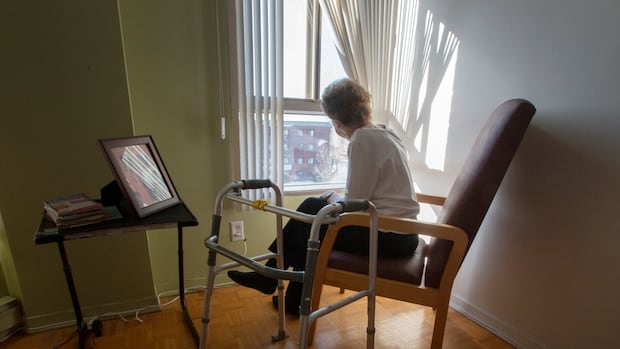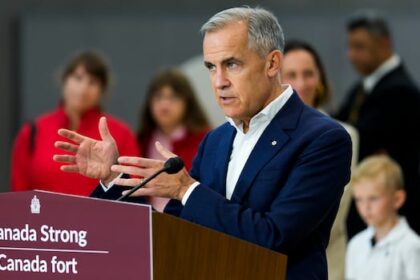ManitobaA coalition of seniors groups is pressing the Manitoba government to make changes to the housing options available and the deteriorating living conditions faced by older adults, while laying down a number of priorities for the province’s incoming seniors advocate.New independent position ‘win’ for seniors, but coalition says older adults’ living conditions need to changeA coalition of groups representing seniors in Manitoba is laying down some of the priorities they would like to see the province’s new older adult advocate work on as they are expected to take office later this year. (Ryan Remiorz/The Canadian Press)A coalition of seniors groups is pressing the Manitoba government to make changes to the housing options available and the deteriorating living conditions faced by older adults, while laying down a number of priorities for the province’s incoming seniors advocate.”The cost of not doing anything is going to just add … exponentially down the road,” said Carmen Nedohin, former chair at the Manitoba chapter of the Canadian Association of Retired Persons. “If we don’t ensure that the conditions improve dramatically, we’re going to have more people homeless. We’re going to have more people going to hospitals … we’re going to have more pressure on family members, we’re going to have more deaths.”Nedohin and representatives of other groups lobbying for older adults in Manitoba held a news conference on Monday to lay out what they consider are some of the priorities for the province’s first seniors and elders advocate. Earlier this year the province announced the creation of the long-promised independent office by Nov. 1. Once appointed, the advocate will set up an independent office that will be tasked with evaluating the issues faced by seniors and produce recommendations on a range of government services, including housing and health care. “The previous administration really didn’t want to talk about it … and here we are today knowing that the advocate is going to be in place … is a huge win for the seniors of Manitoba,” Nedohin said. Carmen Nedohin, former chair of the Manitoba branch of the Canadian Association of Retired Persons, says the creation of the new advocate is a win, but says living conditions of seniors need to dramatically change in the province. (Jaison Empson/CBC)But one of the main sticking points the coalition highlighted for the advocate and the province is the need for significant changes to the housing options available to seniors. The private sector has become the main service provider for assisted living but the monthly cost to live in those facilities ranges between $3,000 to $6,000 — unreachable for many seniors who earn just under $2,000 through their monthly pension, said Kathy Mallet, board member with the Manitoba Seniors Equity Action Coalition.”It’s getting worse as each year goes by,” she said. “It concerns us, especially our First Nation communities who a lot of the elders have to leave their communities … and they can’t afford a lot of these spaces and a lot of them are living in shelters.” Among the priorities for the new seniors advocate to address is the review of current housing options available for seniors and the gaps different groups have in accessing services, Mallet said.The advocate should also look into policy changes to build rent-geared-to-income units for seniors, especially at times when the federal government is prioritizing new housing, said Tom Simms, board member with the Manitoba Seniors Equity Action Coalition.”It doesn’t take a rocket scientist to figure out that the private market is not working … for low- and fixed-income seniors,” he said. “It needs to be a mix of both public sector funded, non-profit funded and private sector funding.” Investigatory powersThe incoming advocate will also be set up to examine individual complaints as well as systemic issues faced by seniors and elders. The position has been legislated to be independent, but the coalition wants to ensure it has enough authority to investigate — including the ability to file subpoenas or get court assistance to compile evidence — similar to the provincial advocate for children and youth.”That’s one area where there’s still some weakness,” said Nedohin. “We want to make sure that their investigatory powers are solid, that they have the strength.”The coalition is also asking the new advocate to make it a priority to review Manitoba’s homecare system: To improve working conditions for employees,and train and recruit more staff to better support older adults. Tom Simms, right, a board member with the Manitoba Seniors Equity Association, says there needs to be a combination of options to provide older adults assisted living. (Santiago Arias Orozco/CBC)The group would also like to see the advocate create an advisory council — made of representatives for older adults from throughout Manitoba — that can provide direction to the new office and review the outcomes of any recommendations made. Another priority is to review the cost of for-profit and not-for-profit long-term care institutions, and move beyond anecdotal evidence toward data that can back decisions, Simms said. “We’ve seen all the system problems,” he said referring to the constraints Manitoba’s long-term care institutions faced, especially during the COVID-19 pandemic. “It’s back on the back burner again.”There’s no expectation that those recommendations be enacted by the incoming advocate immediately, but the coalition is hopeful there will be incremental change. “It’s not just a today problem. It’s not just a past problem, it’s a future problem that we want to see get better,” Nedohin said. Manitoba has not announced who the seniors advocate will be.A spokesperson for the minister of Health says the advocate’s office was created after listening to seniors about the need to improve the services they rely on, and the province will continue looking at ways to strengthen their role over time.ABOUT THE AUTHORSantiago Arias Orozco is a journalist with CBC Manitoba currently based in Winnipeg. He previously worked for CBC Toronto and the Toronto Star. You can reach him at santiago.arias.orozco@cbc.ca.
Thursday, 5 Feb 2026
Canada – The Illusion
Search
Have an existing account?
Sign In
© 2022 Foxiz News Network. Ruby Design Company. All Rights Reserved.
You May also Like
- More News:
- history
- Standing Bear Network
- John Gonzalez
- ᐊᔭᐦᑊ ayahp — It happened
- Creation
- Beneath the Water
- Olympic gold medal
- Jim Thorpe
- type O blood
- the bringer of life
- Raven
- Wás’agi
- NoiseCat
- 'Sugarcane'
- The rivers still sing
- ᑲᓂᐸᐏᐟ ᒪᐢᑿ
- ᐅᑳᐤ okâw — We remember
- ᐊᓂᓈᐯᐃᐧᐣ aninâpêwin — Truth
- This is what it means to be human.
- Nokoma











